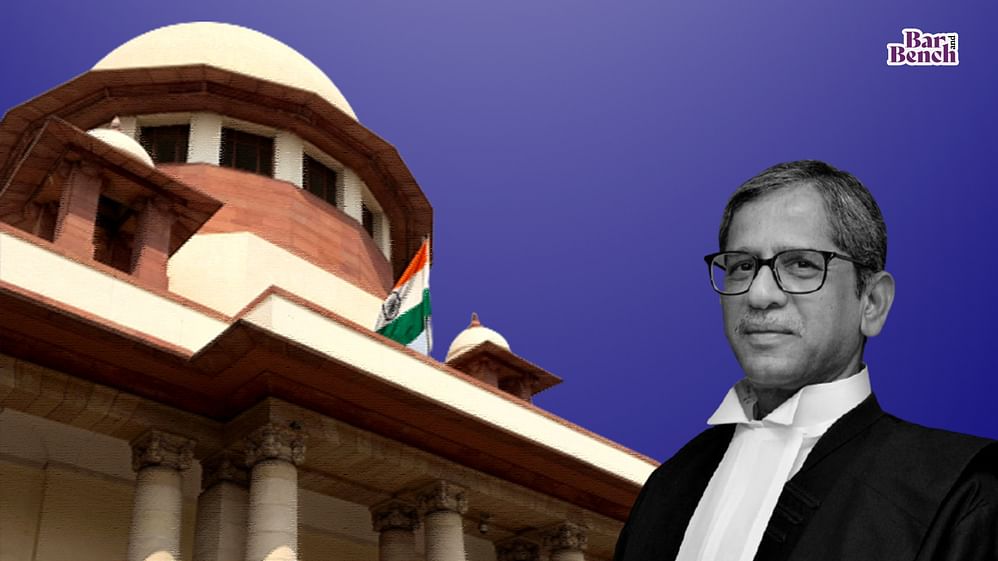
Virtual canteen on "Influence of Cinema on Law & Society", hosted by Delhi High Court Women Lawyers Forum begins
Speakers: Adv Malavika Rajkotia, Dr. Megha Anwer, Sonal Sehgal
Discussion will be moderated by Advocates Suruchi Suri and Nandita Rao
@DHCWOMENLAWYERS @suruchisuri
Speakers: Adv Malavika Rajkotia, Dr. Megha Anwer, Sonal Sehgal
Discussion will be moderated by Advocates Suruchi Suri and Nandita Rao
@DHCWOMENLAWYERS @suruchisuri

Clip from film Damini is played.
Does cinema impact people in the justice and law-making process? : Adv Nandita Rao asks
Does cinema impact people in the justice and law-making process? : Adv Nandita Rao asks

Adv Malvika Rajkotia says she does not believe it directly impacts judges or that judges change their mind upon watching cinema
However, cinema is an aspect of art. The broadcast is wider. Cinema has impacted law by bringing it into the public discourse, she says.
However, cinema is an aspect of art. The broadcast is wider. Cinema has impacted law by bringing it into the public discourse, she says.
Sonal Sehgal recalls reading about a rape case where the judge is stated to have asked if the accused should marry the victim. She remarks that she felt that perhaps the Judge grew up watching bad Hindi films.
Dr Anwer speaks on how cinema can influence the standard of normalcy in what is acceptable.
Adv Rajkotia: The disconnect between the cinematic representation of law and cinema is very vast.
She recalls that there are clients who ask her whether it (legal proceedings) is "like in the cinemas"
Adv Rajkotia: I say no, and invariably it is a shock.
She recalls that there are clients who ask her whether it (legal proceedings) is "like in the cinemas"
Adv Rajkotia: I say no, and invariably it is a shock.
Referring to the case where the Judge is stated to have asked a rape victim if she would marry the accused, Adv Rajkotia says, "That is not a judge influenced by bad films..."
It shows that the victim was devalued "for the purposes of a marriage market", which becomes more important than her personal autonomy, Adv Rajkotia says
Adv Rajkotia: That is the failure of law at a very egregious level.
Adv Rajkotia: That is the failure of law at a very egregious level.
Adv Rajkotia: "Tariq pe Tariq" sequence draws attention to the law's capacity to be manipulated by those in power, not just to the inefficiencies of the legal system ... the question of delay, we know it's a fact ...
Sonal Sehgal: "Court" is a really good film. The first time we have seen a courtroom really depicted as in reality. There shouldn't be any pressure on any art to make any profession look in better light.
Qn: Do movies like "Erin Brockovich" and "Newton" empower ordinary people?
Sehgal: Yes. When you watch them, they are definitely inspiring. And you look back in your life, that you could have fought for ...
Sehgal: Yes. When you watch them, they are definitely inspiring. And you look back in your life, that you could have fought for ...
Adv Rajkotia refers to another movie that she found inspirational, "Jaane Bhi Do Yaaro", which commented on law enforcement machinery
Rajkotia: The end is failure, but it was iconic on so many fronts because of the bravery of the fight.
Rajkotia: The end is failure, but it was iconic on so many fronts because of the bravery of the fight.
Dr Anwer says that one of the things that frustrates her is the focus on an "individual" who would reveal everything and emerge the saviour.
Dr Anwer: You cannot even tell collective tragedies.. like the Titanic sinking without Leo and Kate ... without star-crossed lovers.
Dr Anwer: The problem is casteism, not the police officer who intervenes. I'm talking about "Article 15" here. The reliance on an individual savior is a lie... because no individual can change a structure... there is very rarely an imagination of a collective...
@article15film
@article15film
Mirch Masala (women coming together against feudal, colonial lords) and Kaala are exceptions, Dr Anwer adds.
A clip from "To kill a mockingbird" is played.
Qn: Do films like Article 15 and "To kill a mockingbird" help address prejudices in society?
Sehgal: Yes, but these films are so far and few ... Prejudice against dark skin in India is ridiculous. We are a nation of brown people...
Qn: Do films like Article 15 and "To kill a mockingbird" help address prejudices in society?
Sehgal: Yes, but these films are so far and few ... Prejudice against dark skin in India is ridiculous. We are a nation of brown people...

Sehgal: Then we have this who fair and lovely business...There is an industry in India because of prejudice...
Adv Suri weighs in, notes that in the film "Fashion", the protagonist sleeping with a dark-skinned man is seen as her "ultimate fall from grace."
Adv Suri weighs in, notes that in the film "Fashion", the protagonist sleeping with a dark-skinned man is seen as her "ultimate fall from grace."
There are well-intentioned, socially aware filmmakers trying to dip their toes into difficult issues. But what they end up doing is enforcing Brahmanical notions of upper-caste saviours, Dr Anwer says
A clip from Dilwale Dulhania Le Jayenge is played.
Adv Rao: Women continue to be objectified in cinema... do you think cinema glamourizes sexual harassment?
Adv Rajkotia: Not does it glamourize, it has institutionalized (sexual harassment).

Adv Rao: Women continue to be objectified in cinema... do you think cinema glamourizes sexual harassment?
Adv Rajkotia: Not does it glamourize, it has institutionalized (sexual harassment).


Adv Rajkotia: .. remember the songs like, "Mere Sapno Ki Tani"... In a park, if someone wanted to harass you, they had to do nothing but sing the song to make you uncomfortable
Adv Rajkotia: It is not just cinema... In Mills and Boons novels.. these stereotypes (are there)... that she was going to be mansplained,... we have moved past, but the attitude remains.
Sehgal agrees that films have institutionalized harassment.
Sehgal: Eve-teasing is courting. If you chase a girl around, harass her, then she is supposed to fall in love with you.
Sehgal also speaks on the need to characterize women differently in films.
Sehgal: Eve-teasing is courting. If you chase a girl around, harass her, then she is supposed to fall in love with you.
Sehgal also speaks on the need to characterize women differently in films.
Dr Anwer speaks on how nonsensical ideas of love are portrayed on screen.
Dr Anwer: ... on screen ... men and women interact in these problematic ways where men have all this sexual power.. in reality, the problem is opposite, where women & men are not allowed to interact
Dr Anwer: ... on screen ... men and women interact in these problematic ways where men have all this sexual power.. in reality, the problem is opposite, where women & men are not allowed to interact
Dr Anwer speaks of how it ties to how society is sexually repressed. There is such a taboo that it takes this form of deformation on the screen.
Dr Anwer: Love for a woman is only when it is knocked out of her, she is not allowed to have (these desires)...
Dr Anwer: Love for a woman is only when it is knocked out of her, she is not allowed to have (these desires)...
Adv Rajkotia speaks of how symbols of short hair, cigarette, drink in the hand of the woman suddenly became symbolic of the "vamp. "
That is the influence of how films were used to reinforce the patriarchal structure and is only now liberating itself, Adv Rajkotia adds.
That is the influence of how films were used to reinforce the patriarchal structure and is only now liberating itself, Adv Rajkotia adds.
Adv Rajkotia adds that she agrees with Sonal Sehgal that this could be addressed with more women as directors, producers, filmmakers etc.
Question asked on censorship.
Dr. Anwer: ...the censoring of films is indicative of how people in power or structures of power are interesting in censoring how our minds work. And that is the problem
Dr. Anwer: ...the censoring of films is indicative of how people in power or structures of power are interesting in censoring how our minds work. And that is the problem
Adv Rajkotia: I am against censorship because there can't be one value or standard.. good art will make its space felt... bad, ugly, fascist thinking will get its just views.. unless there is something egregious, child porn, yes (in that case, there should be censorship)
Adv Warisha Farasat asks a question about the movie "Kabir Singh", about the portrayal of the woman as someone without agency
Qn: Can we really say that they don't have a responsibility, or do we need to hold them to some account?
Adv Rajkotia: You can hold them to account by calling it a bad film...Take something like Lolita, it is still a classic. What does it explore? ... It's immoral ...
Adv Rajkotia: You can hold them to account by calling it a bad film...Take something like Lolita, it is still a classic. What does it explore? ... It's immoral ...
She adds that art can be left to judged badly, rather than censoring.
Adv Rajkotia: It's dangerous, and art is too valuable to expect anything other than itself.
Adv Rajkotia: It's dangerous, and art is too valuable to expect anything other than itself.
Dr. Anwer: "Kabir Singh" is a symptom of the problem.
Censoring it as the problem itself is not the way, she opines.
Censoring it as the problem itself is not the way, she opines.
Adv Rajkotia agrees, she points out that the sitcom "Friends" has also aged badly.
Adv Rajkotia: There are problems, that are out of sync, even for New York.
Adv Rajkotia: There are problems, that are out of sync, even for New York.
Sehgal notes that the personal values of people making such content are often "woke", that if they weren't making such films, they would be tearing it down. But there may be other factors in play
Sehgal: What happens is in boardrooms is, this kind of film gets the money...
Sehgal: What happens is in boardrooms is, this kind of film gets the money...
Sehgal refers to the need for "a little self-checking by every individual" when it comes to such films
The event comes to an close after the vote of thanks.
• • •
Missing some Tweet in this thread? You can try to
force a refresh











